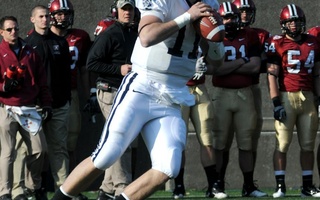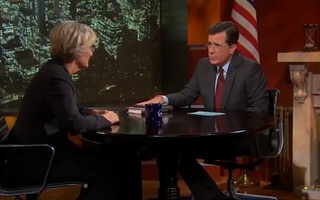There are a number of concrete steps you can take to increase the probability that a job interview will be successful--i.e., that you will receive an offer or will be invited to return for additional interviews. Preparation is the key.
Because interviewing is an unrehearsed conversation between two strangers, the discussion can take as many paths as there are people. For that reason, it is crucial to be comfortable with the unfolding of the process. It helps to think of the process as one where both parties are hoping for a positive outcome. The only thing you can be sure of is that every interview is unique!
Before the Interview
It is difficult to overemphasize the importance of being well prepared for a job interview. Your degree of preparation speaks volumes about your interest level, conscientiousness, and ability to plan ahead. Your preparation will also increase your confidence, your ability to answer questions articulately, and your ability to ask discerning, pertinent questions.
In order to make the best case for your candidacy for a particular job, you need to be prepared with information about yourself AND about the job, company, and field. It is difficult to make a case for a match if you only have information about one side of the equation.
Many people incorrectly assume that they know themselves well enough and that they don't need to spend time thinking about themselves before an interview. It is important to think about yourself specifically in a job setting and to reflect on how your experiences have prepared you for work in that setting. It is also important to be able to articulate to a stranger what he or she is interested in knowing about you. If you are unaccustomed to talking about yourself, it may be awkward at first. If you are not shy about discussing your talents and accomplishments, it may take some practice to sound confident but not arrogant. If you tend to be humble, it may take practice to avoid sounding overly self-deprecating.
To research an organization or a company, begin by reading their own promotional literature. If it is not available at OCS or another library, call the organization or company and ask if they would send you their annual report or any other literature. It is best to do some work beyond the company's own literature, however, because it will allow you to demonstrate that you took the initiative to find out more. Your organization research can begin in the OCS Resource Collection and other libraries with trade magazines, newspaper articles, annual reports, electronic databases and more.
Try to have a basic grasp of the duties of the specific position for which you are interviewing, as well as how that position fits into the overall organization. Think about how that position contributes to the success of the company, and gear your comments to show how your background and talents would enable you to maximize that contribution.
First Impressions
Most interviewers will admit (and research supports) that they have largely made up their minds about a candidate within the first five minutes of meeting him or her. Important "first impression" indicators? Arriving on time, a firm handshake, sustained eye contact, a warm smile, good posture, and introducing yourself in a relaxed and confident manner.
A few basics about superficial presentation bear repeating. A well-groomed, professional appearance is essential. Anything else will detract from the best possible presentation you can make. A good way to determine suitable attire is to look at what people in your particular field are wearing. Men and women should generally plan to wear a fairly conservative suit in a fairly conservative color. You don't want to give your clothes a second thought as you go to the interview. You do want to feel comfortable and confident in whatever you choose to wear.
You should always bring along extra copies of your resume, something to write on, and something to write with. You should also bring a list of 6-10 questions that you plan to ask of the interviewer. It is important to have more prepared that you will be able to ask just in case the interviewer answers some of your questions during the conversation.
The Heart of the Interview
The age-old advice to "be yourself" is still the best general thought to keep in mind as you prepare for an interview. When you think about being yourself, however, concentrate on being your "best self." This thought extends from the suit you wear to the examples from your past that you choose to highlight. An interview is a brief period of time in which to make an impression. You want yours to be a positive one. Present the highs and not the lows, the enthusiasm and not the doubt. No one denies that most people have negative experiences, low moments, and uncertainty about major decisions, but in 30-45 minutes, there simply is not time to discuss them. By focusing on positive elements, you will help to make the tone of the entire interview a positive one.
The format of the interview can vary widely--from a structured series of questions to an informal wide-ranging conversation. Lists of potential interview questions can be found in many books and in OCS handouts. Reviewing them is an excellent way to clarify your thoughts about your past experiences and future goals. Actually saying the answers out loud, whether to yourself, a friend, or in a mock interview is better practice than just thinking about them.
Read more in News
ScoreboardRecommended Articles
-
Interview Motto: Be PreparedWhat's the key to an effective interview? Preparation. Knowing the position, the employer's firm, and the employer's industry is essential
-
Three Guards Implicated in Theft of ElectronicsThree Harvard security guards were identified in February as suspects in an investigation of stolen electronics, according to incident reports filed by the Harvard University Police Department.
-
 Yale's Witt To Take the Field
Yale's Witt To Take the Field -
 Faust Reflects on Colbert Experience
Faust Reflects on Colbert Experience -
Harvard Law School Uses Skype to Interview ApplicantsFrom applicants living in Asia to military personnel who are on active duty, qualified prospective students for Harvard Law School were interviewed through the free videoconferencing software Skype for the first time.
-
 Ace Your Interview
Ace Your Interview













